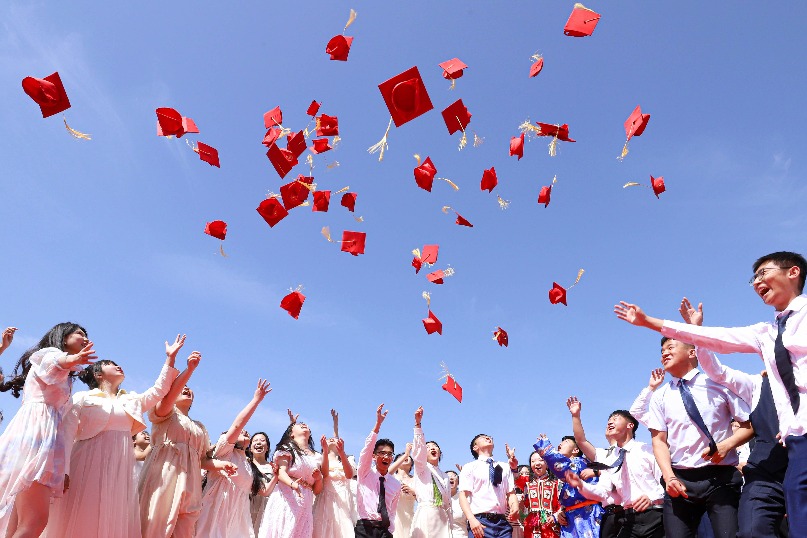Stigma of virus hard to erase
By Peng Siqing | China Daily Global | Updated: 2020-03-03 08:18

People made vulnerable by the epidemic need more support
The novel coronavirus epidemic has had a severe impact on society, with many people facing great difficulties in their lives or business operations. Although the difficulties they face may only be temporary, the social consequences caused by the epidemic could last for a long time. People who are struggling need the support of the whole of society in this difficult time.
The impacts of the epidemic have been felt in multiple aspects of social life. The virus has spread around the world and it is hard to predict when it will end. The negative sentiments caused by the epidemic and some crude practices in epidemic prevention and control enforcement could damage social relationships and even divide society, giving rise to disadvantaged groups, albeit temporarily.
The first vulnerable group is comprised of those infected with the virus and their families. Those infected with the virus are not only victims but also the sources of new infections. They not only suffer from the virus, but also face discrimination and exclusion. The public's anxiety over the epidemic could transform into alienation and hostility against those who have had the virus. Even after their rehabilitation, these people could be excluded from normal life for a period.
The second vulnerable group includes those from Hubei province, especially the capital city Wuhan. People living in smaller epidemic areas, such as the residential communities or working units where infections are found, are considered part of the dangerous population. Most of the people inhabiting the epidemic areas are healthy people. But they are labeled as "dangerous" merely because of their home addresses. Moreover, some of them who stay at home in self-isolation as a preventative measure see their homes marked out as a warning. In such a special period, such measures are understandable, but their side-effects should be monitored.
Since the outbreak of the virus, restrictive measures have been carried out in some places, creating barriers for certain groups of people, who constitute the vulnerable groups whose rights are restricted. With cities locked down, roads blocked and residential communities sealed off, many people find they cannot enter a city because they are not locally registered residents, or cannot enter a residential community because they are not property owners. They might have decent jobs and stable incomes in the cities where they work and are local taxpayers and builders, but now they are discriminated and marginalized because of the lack of local hukou (household registration) or property ownership.
Moreover, face masks have been in short supply since the outbreak began, leading to those who have no mask being shunned. These people were not well prepared at the beginning of the outbreak, and found face masks had been sold out everywhere. At the peak of the epidemic, those who do not wear a mask draw uncomfortable glances wherever they go. And in some places, people are banned from taking public transport without wearing a mask.
In terms of business, many enterprises in catering, tourism or entertainment have been forced to suspend their operations during the epidemic.
The owners of these enterprises may see their businesses on the brink of going bankrupt. Enterprises in some places are required to pay salaries to their employees despite the delay of business operations, further exacerbating their plight. Many small and medium-sized enterprises are close to bankruptcy because of a lack of funds.
The closedown of SMEs will lead to unemployment. Those who are laid off in the epidemic are likely to be reduced to impoverished status. These temporary disadvantaged groups arising during the epidemic are fragile. They are not able to weather the impacts in social life like ordinary people do, and find it difficult to defend their legitimate rights and interests. In some cases, these vulnerable ones may have been ones with status in society, who have lost their original positions in society because of the epidemic.
The epidemic will have extensive and long-lasting influence on a large proportion of the population. The above-mentioned six temporary vulnerable groups cover a great number of people. If their difficulties cannot be solved in a timely manner, it will not only affect their quality of life and sense of happiness, but also undermine social harmony and stability, causing a social divide and crisis.
Therefore, we call for greater attention to be given to these epidemic-induced vulnerable groups and measures to be taken to help solve their difficulties and mitigate social division.
There are some effective practices implemented by the governments in some places that we can learn from. For example, Suzhou in Jiangsu province has rolled out policies to support SMEs to help them overcome their difficulties; Hebi in Henan province proposed to "isolate but not estrange, and treat people returning from Wuhan like families". We also call for helping hands be lent to those without a face mask by sharing or distribution them from work units or neighborhood communities.
We believe that so long as the governments at all levels and the society reach a consensus on helping those vulnerable groups, we can overcome the difficulties, win the combat against the epidemic, and transform the crisis into opportunities, further promote social harmony and bolster people's sense of gain and happiness. If so, the above-mentioned vulnerable groups will not be permanent and they will show more adoration for the country and more trust to the government.
The author is a professor with the marketing department of Guanghua School of Management at Peking University. The author contributed this article to China Watch, a think tank powered by China Daily. The views do not necessarily reflect those of China Daily.
























